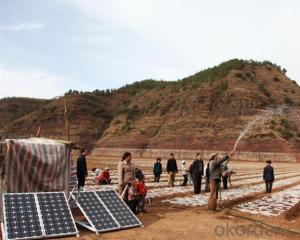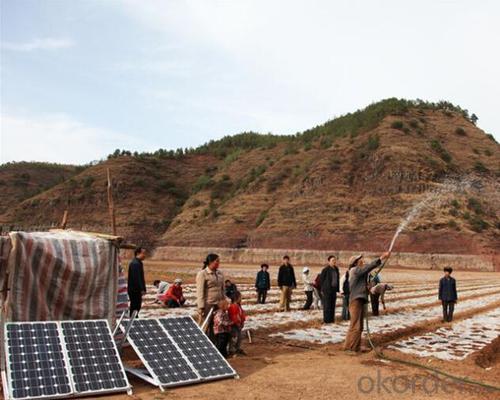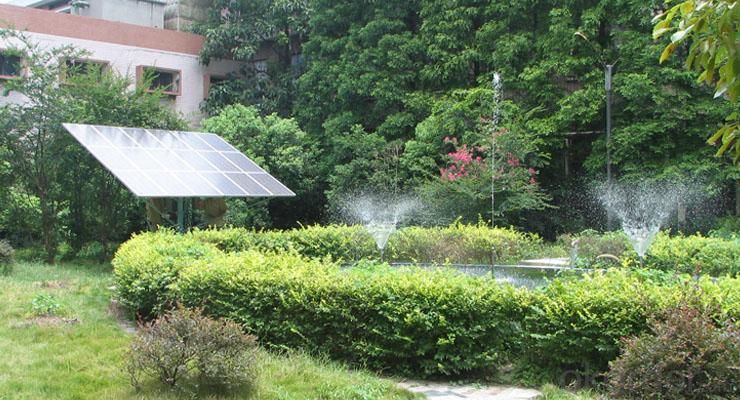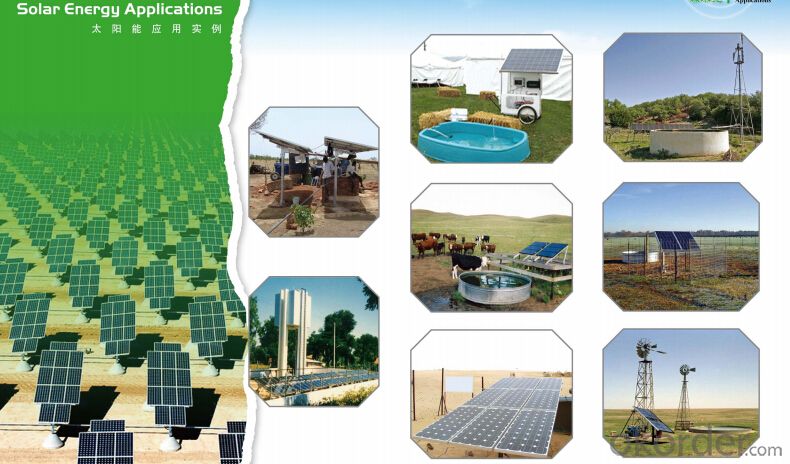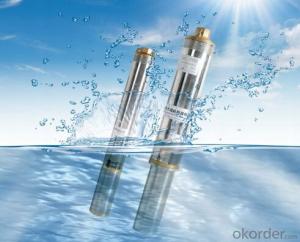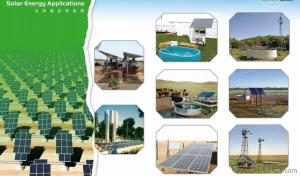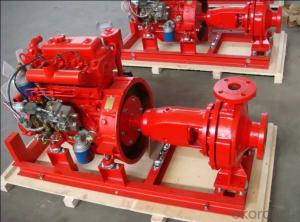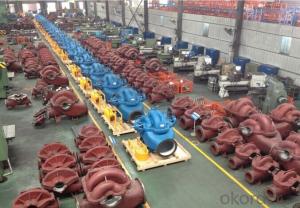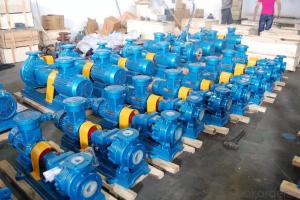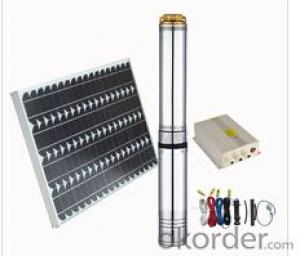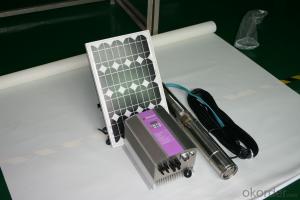Solar Water Pump Centrifugal Pump System 0.8-1KW for Agricultural Irrigation
- Loading Port:
- Shanghai
- Payment Terms:
- TT OR LC
- Min Order Qty:
- 10 pc
- Supply Capability:
- 1000 pc/month
OKorder Service Pledge
OKorder Financial Service
You Might Also Like
Solar Water Pump Centrifugal Pump System 0.65KW for Agricultural Irrigation
The photovoltaic pumping system is different from the traditional AC pumping system , and the photovoltaic pumping system utilizes solar cells convert solar energy into electric energy , then the photovoltaic pumping inverter drives ac motor for the pump running , and pumping up water from water well , river , lake etc areas and then transport to the destination to satisfy our requests for the water demand .
Photovoltaic arrays adopts solar radiation energy to convert it to electric power ,providing the motive power for the whole system . And the function of the solar pumping inverter is converting the DC power output from PV array to AC power to drive the pump to finalize the water pumping up as well as adjusting the output power real-timely according to the change of sunlight intensity , in this way , the system realizes the max power point tracking and the solar energy can be utilized furthest
The whole system solves the water pumping up requests perfectly , omitting the battery bank and charge controller etc equipments , so it is very economical and environmental . Since they are with the merits of low carbon , energy conversation , environmental protection etc , so they have a broad market foreground and great social value
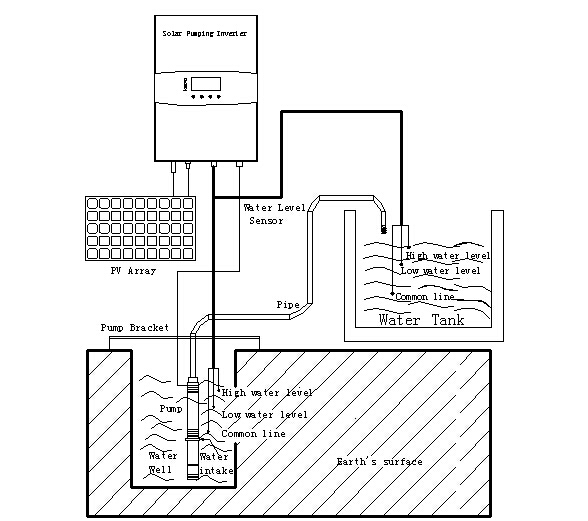
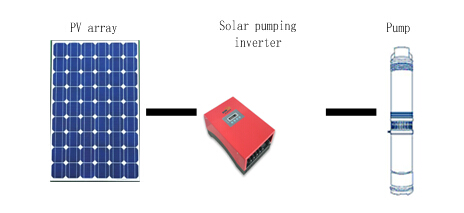
2.2 Application
Agricultural irrigation
Desert manage
Domestic water
Grassland animal husbandry
city waterscape
Island water supply
Landscape and fountain system of municipal engineering , city square , hotels and residence community
2.3 About product
This product is using a high performance digital signal processing chip, can provide solution for solar water pumpingsystem with high cost performance. Solar pumping system as a whole block diagram as shown in 2.
SHP series inverter has the following features:
a. True max power tracking technology (TMPPT) with our own intellectual property; effectively improve the use ratio of PV array. The stable tracking efficiency can reach 99.2% , Solving the problem of bad tracking efficiency and running unstability under the situation of sunlight intensity quick change when comparing with the traditional MPPT method .
b. Adopt efficient IPM power module from Mitsubishi Company with high reliability.
c. With the function of high and low water level detection , high safety factor.
d. Automatic anti-drying protection function , with multi-protection for motor
e. Multi-language LCD display , easy for operation , very user-friendly
f. The independent developed principal computer with our own intellectual properties , remote monitoring is available
g. Modular design , direct plug-in terminal , good-looking appearance, easy for installation , operation and maintenance .
h. Suitable for the pump adopted three phase asynchronous motor
i. Complete digital control , with the function of full automatic running and data storage .
j. Perfect protection system , with the protection function for lighting , over voltage , under voltage , short circuit , over loads , water drain off , low sunlight , over heating etc ,
k. Adopt the complete radiating system , so radiating efficiency is better and the service life is longer
l. Through strict environmental test , adapt the rigorous environment :-10℃~+50℃
m.No impacted mains supply power switch function (optional ), All-weather running available
n. Through strict environmental test , adapt the rigorous environment :-10℃~+50℃
FAQ
1. How fast will my system respond to a power outage?
Our solar inverters typically transfer to battery power in less than 16 milliseconds (less than 1/50th of a second).
2. What kind of batteries do the systems include?
Our solar backup electric systems use special high-quality electric storage batteries.
3. How do I install my system?
A solar backup inverter is connected to a home electric system , we will supply detailed installation manual and videos for our customers .
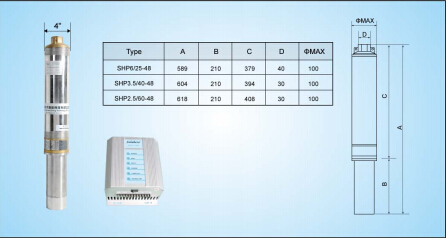
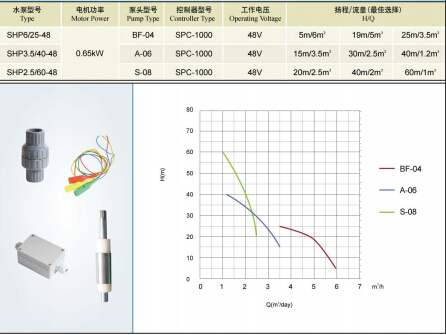
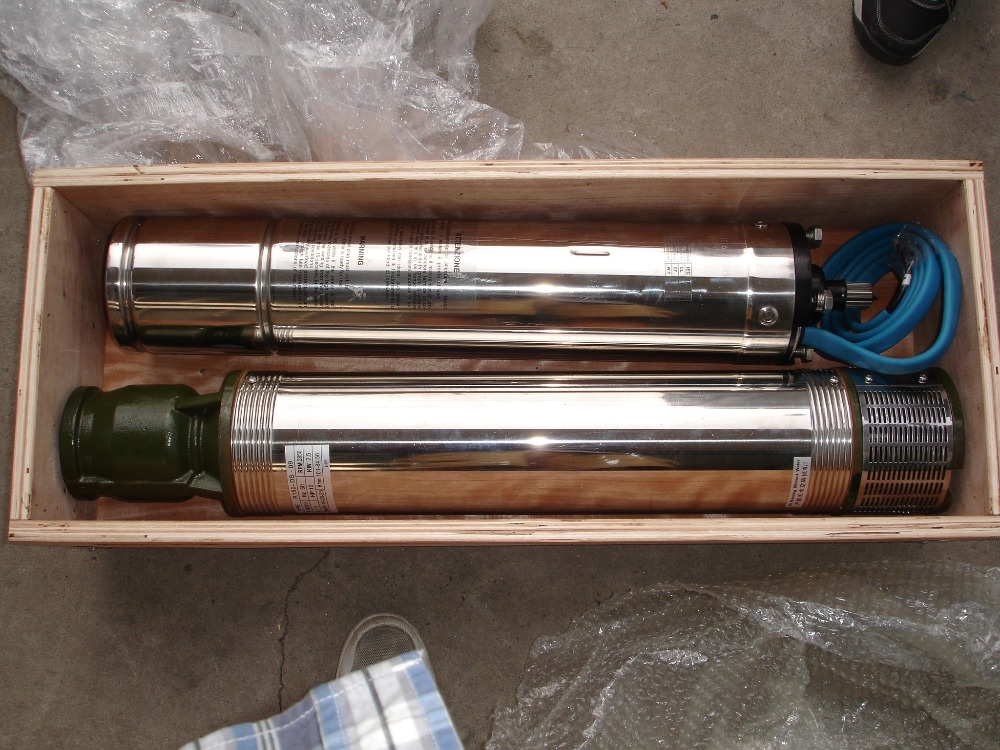
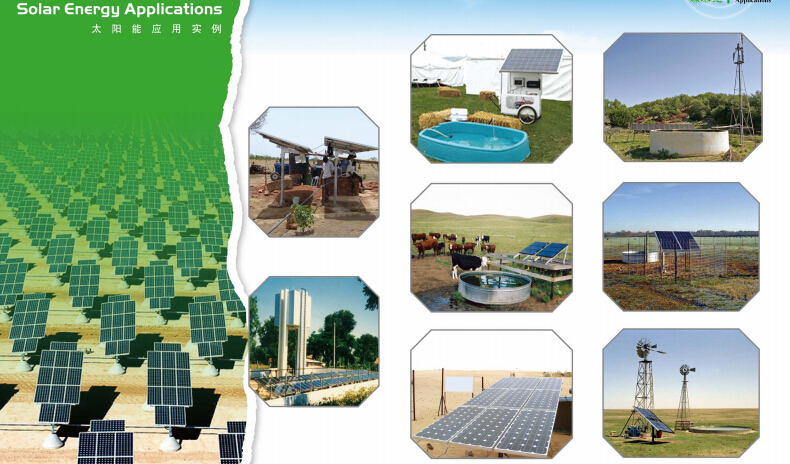
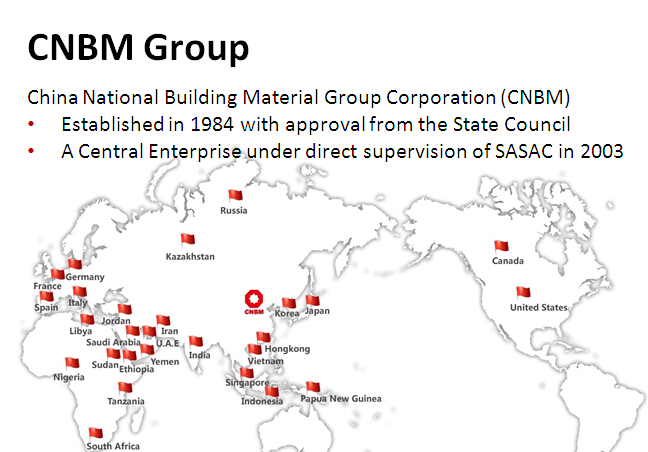
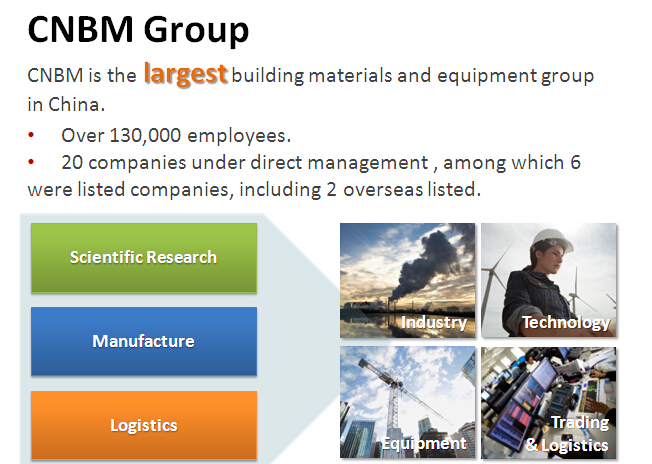
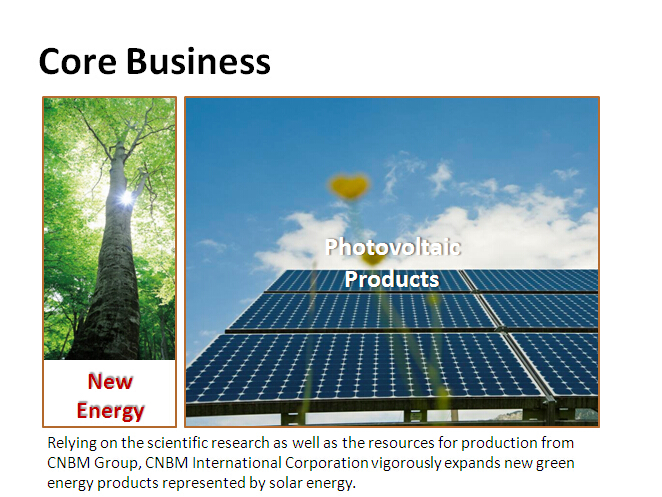

- Q: How does a solar pump handle water with high levels of bacteria?
- A solar pump does not specifically address the issue of high bacteria levels in water. However, solar pumps can be used to extract water from a source, which can then be treated using appropriate methods such as filtration, chlorination, or UV sterilization to eliminate or reduce bacteria levels.
- Q: Can a solar pump be used for water supply in refugee camps or emergency situations?
- Yes, a solar pump can definitely be used for water supply in refugee camps or emergency situations. Solar pumps are powered by sunlight, making them highly suitable for areas with limited access to electricity. They can efficiently extract water from wells, boreholes, or other water sources, providing a reliable and sustainable water supply for the displaced populations in refugee camps or emergency situations. Additionally, solar pumps are low-maintenance, environmentally friendly, and cost-effective, making them an ideal solution in such scenarios.
- Q: How do solar pumps handle water with high bacterial or microbial content?
- Solar pumps are primarily designed to handle water with high bacterial or microbial content by utilizing filtration systems. These pumps often incorporate filters that are specifically designed to remove impurities, including bacteria and microbes, from the water before it is pumped. Additionally, some solar pumps also use UV sterilization technology to further disinfect the water, ensuring it is safe for use. Overall, solar pumps are effective in handling water with high bacterial or microbial content by employing filtration and sterilization mechanisms.
- Q: Can solar pumps be used in areas with limited sunlight or shaded locations?
- Solar pumps are most effective in areas with ample sunlight, as they rely on solar energy to power their operation. However, there are models available that can still function in areas with limited sunlight or shaded locations, although their performance may be reduced. It's crucial to assess the specific solar pump's capabilities and consult with experts to determine its suitability for such conditions.
- Q: How does the cleanliness of the solar panels affect the performance of a solar pump system?
- The cleanliness of solar panels has a significant impact on the performance of a solar pump system. Solar panels are designed to convert sunlight into electricity, which powers the pump system. However, when the panels are dirty or covered with dust, leaves, bird droppings, or other debris, their efficiency decreases. Dirt and debris on the surface of solar panels obstruct the sunlight from reaching the photovoltaic cells, reducing their ability to generate electricity. This results in a decrease in the overall power output of the solar panels, which directly affects the performance of the pump system. The pump may not receive sufficient power to operate at its optimal levels, leading to reduced water flow or even complete failure of the system. Regular cleaning and maintenance of solar panels are essential to maintain their efficiency and performance. Cleaning the panels helps to remove dirt, dust, and other debris, allowing maximum sunlight to reach the photovoltaic cells. This ensures that the panels can generate the required electricity to power the pump system effectively. In areas with high levels of air pollution or dusty environments, the frequency of cleaning may need to be increased. Neglecting to clean the panels regularly can result in a significant decrease in the performance of the solar pump system, leading to operational inefficiencies and increased energy costs. In conclusion, the cleanliness of solar panels is directly related to the performance of a solar pump system. Regular cleaning and maintenance of the panels are crucial to ensure optimal power generation and efficient operation of the pump system. By keeping the panels clean, the system can operate at its full potential and provide consistent water flow for various applications.
- Q: What is the cost of installing a solar pump system?
- The cost of installing a solar pump system can vary depending on several factors. These factors include the size and capacity of the pump, the complexity of the installation, and the location. On average, the cost of a solar pump system can range from $3,000 to $10,000. However, it is important to note that this is just the initial installation cost, and there may be additional expenses for maintenance and repairs in the long run. Additionally, government incentives and rebates may be available in some regions, which can help offset the cost of installation. It is recommended to consult with a professional installer to get an accurate cost estimate specific to your requirements and location.
- Q: Can a solar pump be used for water supply in parks or recreational areas?
- Yes, a solar pump can definitely be used for water supply in parks or recreational areas. Solar pumps are a sustainable and environmentally friendly option for water supply as they utilize solar energy to operate. They do not require grid electricity or fuel to run, making them cost-effective and reducing the carbon footprint. Solar pumps can be used to pump water from a source like a well, pond, or river and distribute it throughout the park or recreational area for various purposes, including irrigation, drinking water fountains, decorative water features, and even for filling up swimming pools or water play areas. They can be easily installed and require minimal maintenance, making them an ideal choice for parks and recreational areas where a reliable and efficient water supply is essential.
- Q: Can a solar pump be used in conjunction with a drip irrigation system?
- Yes, a solar pump can be used in conjunction with a drip irrigation system. Drip irrigation systems are designed to deliver water directly to the roots of plants, which makes them highly efficient. By using a solar pump to power the drip irrigation system, you can harness the power of the sun to provide a sustainable and cost-effective solution for watering your crops or plants.
- Q: Can a solar pump be used for water supply in remote communities?
- Certainly, water supply in remote communities can be effectively facilitated by the use of solar pumps. These pumps offer an exceptional solution for delivering water in areas where access to electricity or grid infrastructure is absent. Powered by solar energy, they exhibit high efficiency, affordability, and environmental friendliness. The installation of solar pumps in remote communities allows for the extraction of water from underground sources, such as wells or boreholes. These pumps can cater to a wide range of water needs, including drinking, irrigation, livestock, and domestic usage. They can be tailored to accommodate various flow rates and lift heights, depending on the specific demands of the community. A notable advantage of solar pumps is that they operate without the need for any fuel or electricity, thereby reducing operational costs and reliance on external energy sources. Additionally, these pumps require minimal maintenance and can function for extended periods without significant issues. Consequently, they serve as a dependable and sustainable solution in remote communities, where regular maintenance and access to spare parts may pose challenges. Moreover, solar pumps can be integrated with storage systems, such as tanks or reservoirs, to ensure uninterrupted water supply even during periods of low sunlight or at night. Excess solar energy can be stored for utilization during non-sunny periods, guaranteeing a consistent water supply for the community. In conclusion, solar pumps prove to be an ideal choice for water supply in remote communities. They offer a reliable, cost-effective, and sustainable method of accessing clean water in areas with limited infrastructure or energy resources. By harnessing the power of the sun, solar pumps hold the potential to significantly enhance the quality of life and foster development in remote communities.
- Q: Can solar pumps be used for water supply in developing countries?
- Yes, solar pumps can be used for water supply in developing countries. Solar pumps are a sustainable and cost-effective solution that can provide reliable access to clean water in areas with limited or no electricity. They can be used to extract water from wells, rivers, or other water sources, and can be easily maintained and operated. Additionally, solar pumps reduce the reliance on fossil fuels and help mitigate the environmental impact associated with traditional water pumping methods.
Send your message to us
Solar Water Pump Centrifugal Pump System 0.8-1KW for Agricultural Irrigation
- Loading Port:
- Shanghai
- Payment Terms:
- TT OR LC
- Min Order Qty:
- 10 pc
- Supply Capability:
- 1000 pc/month
OKorder Service Pledge
OKorder Financial Service
Similar products
Hot products
Hot Searches
Related keywords
